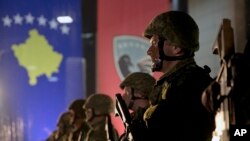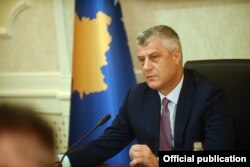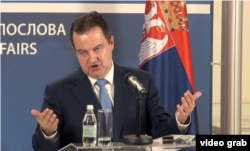The presidents of Serbia and Kosovo are scheduled to address the U.N. Security Council on Monday afternoon following Kosovo's decision to transform its existing 4,000-strong security force into a regular army and Serbia's threat of armed intervention.
Kosovo was a province of Serbia and came under U.N. and NATO administration after a 1999 NATO-led air war halted a Serbian crackdown on ethnic Albanian separatists. The Security Council resolution that established the interim U.N. administration left the final status of Kosovo in question.
Kosovo's predominantly ethnic Albanian leadership declared independence in 2008, and Kosovo has been recognized by some 108 countries. But Serbia rejects its secession and Russia, a close ally and veto-wielding Security Council member, has blocked Kosovo from becoming a member of the United Nations.
Kosovo's President Hashim Thaci said Sunday that its parliament's decision to turn the Kosovo Security Force into an army is "irreversible."
Serbia's Foreign Minister Ivica Dacic said Sunday that President Aleksandar Vucic will insist at the Security Council meeting that the army was formed in violation of the 1999 U.N. resolution.
Serbia's government has warned it might use its own military to respond, with Prime Minister Ana Brnabic saying that's "one of the options on the table." An armed intervention by Serbia could bring a confrontation with NATO-led peacekeepers stationed in Kosovo since 1999.
Kosovo's Thaci said the new army will be professional and multiethnic, with 5 percent of the troops coming from the ethnic Serb minority.
He advised Serbia's Vucic to take a cue from Serbs who live in Kosovo "who feel calm and who take part in the army."
The United States hailed the vote by Kosovo's parliament to form a new army, and reaffirmed "its support for the gradual transition ... to a force with a territorial defense mandate, as is Kosovo's sovereign right."
But Russia denounced the move, saying the predominantly ethnic Albanian force must be "disbanded" by the NATO mission in the country.
NATO and the European Union — which has led talks in recent years aimed at improving ties between Kosovo and Serbia — expressed regret that Kosovo decided to go ahead with the army formation.
NATO Secretary-General Jens Stoltenberg called on the Balkan neighbors "to remain calm and refrain from any statements or actions which may lead to escalation."
He said NATO remains committed "to a safe and secure environment in Kosovo and to stability in the wider Western Balkans," and will "re-examine the level of NATO's engagement with the Kosovo Security Force."
U.N. Secretary-General Antonio Guterres affirmed the U.N.'s desire to maintain the existing Kosovan force as the body that ensures the safety of Kosovo, U.N. deputy spokesman Farhan Haq said late Friday.
The U.N. chief called for restraint and urged the parties to "refrain from actions that could raise tensions and cause a further setback in the European Union-facilitated dialogue for the normalization of relations between Belgrade and Pristina."









